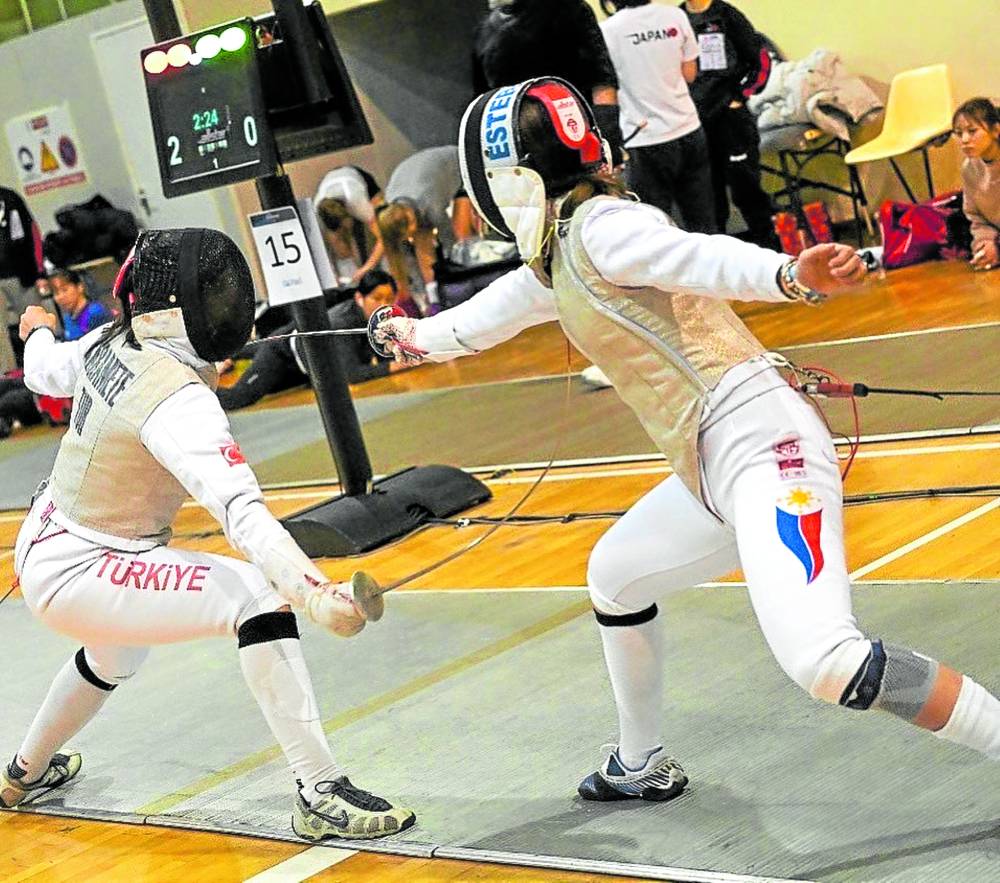
Maxine Esteban (right) in action in France. CONTRIBUTED PHOTO/AUGUSTO BIZZI
Two tournaments into her long journey from an injury that stalled her fencing progress, Maxine Esteban has learned to temper her expectations.
“I knew that I was coming into the tournament with a goal of simply getting back into circulation with a strong recommendation from my coach and physician to fence moderately,” Esteban said after her stint in the World Cup in Paris last month. “I was very cautious with every move, careful not to do any risky movements.”
The 21-year-old fencer managed four out of six wins in her poule, dropping matches to Olympians Irem Karamete of Turkey and Sabrina Massialas of the US. “To be honest, I think I could have won it all if I wasn’t wary about hurting my knee again.”
Those losses put her in the direct elimination against Olympian Fanni Kreiss of Hungary. She lost and finished 120th out of 212 fencers. She did, finish best among Southeast Asian Games medalists who competed in the event and fared better than teammate and Filipino men’s No. 1 Nathaniel Perez.
But getting close to the round of 64 left the former Ateneo ace wanting more.
“It wasn’t the finish I would have wanted. I had been on top 64 several times before my injury,” she said.
In her second tournament of the year, the Challenge International des Hauts de Seine French Opens, Esteban made it to the round of 64 after winning four of six matches in the poule and dispatching an opponent in the direct elimination despite taking things easy toward the end of the match as a
precaution.
“I was leading by a large margin until the last 10 seconds when she caught up by three points,” she recounted. “Fencers who are trying to catch up always advance very aggressively in the last few seconds. As I didn’t want to put myself in any risk, I simply let her advance towards me.”
Esteban, however, is demanding more from herself as she marches onward to her ultimate dream: Making the Paris 2024 Olympics.
“[After the two tournaments], I started training again,” she said. “One of the things I realized during the last two competitions is the importance of physical and strength training post-ACL surgery. “I will need to increase my level of fencing to at least around 80 to 85 percent of my [level before I was injured].
“I really need to increase my muscle power, balance, and improve my core strengths and stability. So, I plan to focus on this for the next three months aside from returning to free fencing again,” she added.
“Hopefully, by April, as the Olympic qualifiers start, I will already be in the same, if not better, shape than before.”
Esteban will compete in one more tournament in Europe before flying to Egypt for the World Cup in Cairo and she hopes to do better there.
“After the [second] competition, I spent the next three days reflecting about the bouts that happened and the mistakes I made. I think the mistakes were committed because I am not in a good shape yet. Although I made it to the table of 64s, I wasn’t satisfied at all,” she said.